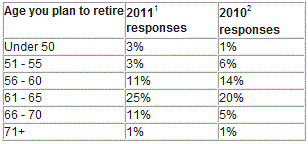-
10% of Brits don't plan to retire at all
-
378,000 Brits plan to retire over the age of 71
-
Number of women planning to retire later doubles
The number of people planning to retire between the ages of 66 and 70 has doubled to one in ten since last year as people look to retire later, according to research1 from Baring Asset Management. The research also reveals that 10% of the working population, the equivalent of 3.5 million people, have no plans to stop working and 12.8 million (36%) of non-retired British adults are unable to say what age they hope to retire.
Today, over a third (37%) of non-retired British adults intends to retire over the age of 61. This is an 11% increase on last year2, demonstrating an overall upward shift in the age at which people anticipate to be able to stop working. To add to this, the number of people planning to retire in the younger age bracket between 56 and 60 has steadily decreased year on year since 20083 (31%) to a low of 11% this year.
Table showing percentage of non-retired British adults planning to retire at these ages:
Worryingly, of those aged 65 and above that are currently working, a quarter (259,000), say they do not plan to retire at all and one in ten (514,000) working 55-64 year olds also see retirement as an impossibility.
What's more, there is also great uncertainty in the higher age groups about when they will be able to retire with 15% of over 65s saying they don't know when they will retire and nearly a third of those aged 45-64 (31%) unable to give an age when they expect to be able to retire; a critical age for the final stages of retirement planning.
Men plan to retire later than women with 13% intending to retire between 66-70 compared to 9% of women. However, this number has more than doubled since 2010, when just 4% of women planned to retire at 66-70. Despite women generally planning to retire earlier than men, more and more women are now facing face later retirement.
On a regional basis, the non-retired in Wales and the South West are most uncertain of when they will retire, with over a third (39%) saying they do not know when their last working day will be. In the South East, 15% do not plan to retire at all, more than any other region; this is also a 4% increase on 2010's figure.
Marino Valensise, Chief Investment Officer at Barings, comments, "It is apparent that the outlook for those planning their retirement is very uncertain for many people. We have seen the cost of living continue to rise, making retirement more expensive and resulting in many more people having to put retirement off for a few more years. With increased longevity and people not saving enough, the working population of those aged 65 and over will inevitably continue to increase.
"It is crucial that people take financial advice well in advance of their anticipated retirement, carefully assessing their investment portfolios, as this could make all the difference in the long run."
|



